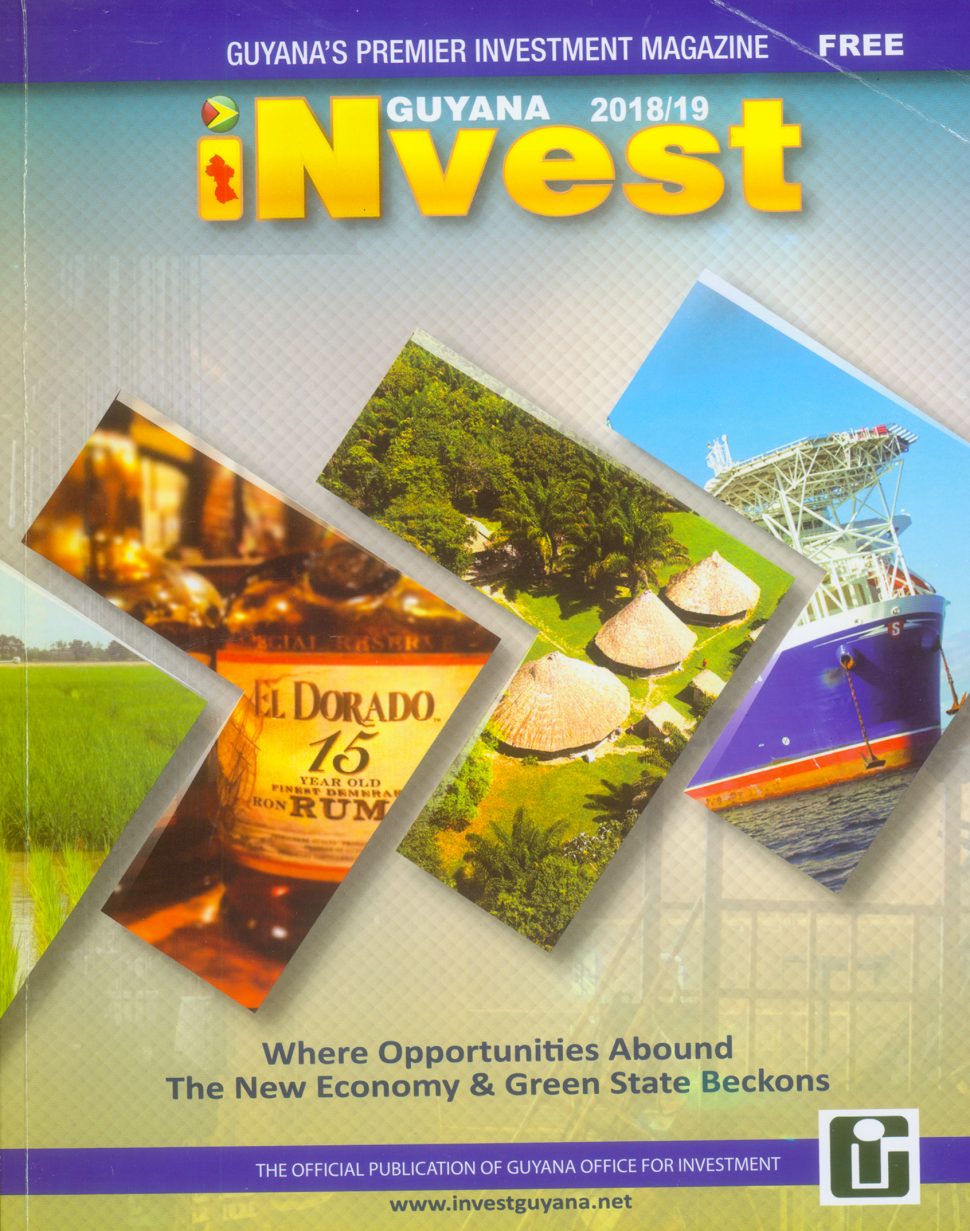The recently released 2018-2019 issue of INVEST, the official publication of the Guyana Office for Investment (GO-Invest), focuses repeatedly and hardly unexpectedly on the prospects that inhere in the country’s significant oil and gas finds though the publication is mindful to underscore the government’s declared commitment to a Green State Development Strategy (GSDS) as “a catalyst for increased investment and sustainable development.”
Government, it appears, envisages impetus being provided for the unfolding of the GSDS over the next two decades through what it says will be “significant levels of financial input,” much of which, presumably, will come from revenues secured from the oil and gas sector. President David Granger, himself, in his message published in the current issue of INVEST Guyana, declares that “the prospect of becoming a petroleum state” will not stand in the way of the country moving “irreversibly towards the establishment of a green state, though only time, discipline and the practical demonstration of a national preference for environmental sensitivity over the potential lure of a profusion of petro- dollars (a full page back cover ExxonMobil advertisement and a profusion of a mix of articles and references to the dawn of the oil and gas era appearing in the publication attest to the ever present oil and gas factor in official thinking) may well provide clues to what might win out in the end.
If, on the one hand, the “private sector perspective” proffered in the publication articulates “high optimism” arising out of what it says is the transformation taking place “as oil production nears in 2020,” the unmistakable concession that the economy is underperforming at this time cannot be overlooked. Nowhere is this clearer than in the publication’s introductory article which excitedly parades “projections for major government investments,” the “continuous and changing (urban) skyline,” “tourism development opportunities” and the impending opening of the multi–million-dollar MovieTowne and Entertainment Complex as indicators of what it suggests are the uplifting economic times that lie ahead.
Still, the sense of economic ‘feel good’ and optimism which INVEST Guyana seeks to create cannot disguise the contemporary challenges, not least, high unemployment, a sluggish commercial environment and a growing sense of national urgency about the need for the economy to turn around – and quickly. While, for example, articles appearing in the current issue of INVEST speak to themes like building indigenous communities, a more efficient energy infrastructure and housing, all of these are sectors facing what in some instances (energy being perhaps the best example) are formidable challenges for which there are no immediate-term solutions.
Challenges lie ahead too for the government’s targeted focus (articulated in separate articles in the current issue of INVEST Guyana) on restructuring the sugar industry, expanding the country’s international rice market and turning around a tourism industry that has so far decidedly failed to live up to age-old pronouncements about the country’s “tourist potential.”
If there is every reason to believe that investor interest is likely to grow in the period ahead primarily on account of the oil and gas factor, no concreate official evidence has been tendered to suggest that the promised restructuring and relocation of the crucial Guyana Office for Investment (GO-Invest) has actually materialized. Government is still in the process of providing potential expatriate investors with evidence that Guyana is really and truly open for investment. The reality is that some measure of bureaucratic red tape and a lack of capacity still persists, GO-Invest notwithstanding and there are those who still question the agency’s boast of a “highly skilled and motivated team.” One must wait and see whether the Agency’s most recent promise of structural change reflected in its promise in an article published in the current issue of INVEST to “revamp its operations with carefully crafted promotional strategies and robust international outreach to attract investments and promote exports for maximum returns without jeopardizing the public good” holds good.
The accession of the coalition administration has witnessed an official focus on the role of Guyanese in the diaspora in the country’s development process. That was attended by an early and aggressive outreach exercise, spearheaded by President Granger himself, in an effort to create the sense of excitement and opportunity afforded by what were, in effect, new opportunities for both Guyana as a country and for its citizens residing in the diaspora. The University of Guyana benefitted from what, perhaps, was the highest level of diaspora response, with several fora being staged locally for overseas-based academics to return to help re-build a UG that had all but collapsed over the previous decades. What is apparent, however, is that Guyana, for a host of reasons, still lacks the enabling environment to accommodate a groundswell of keen Guyanese-born potential investors and highly qualified professionals who may well be ready to roll up their sleeves and help take the country forward.










